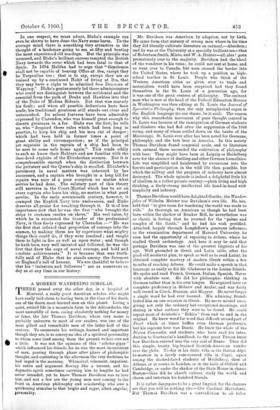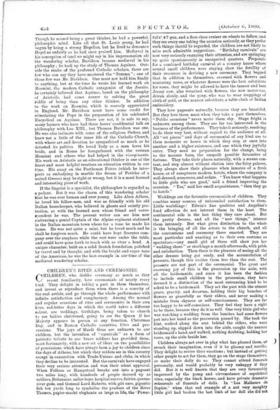A MODERN WANDERING SCHOLAR.
THERE passed away the other day, in a hospital at Montreal, a really great American scholar, who might have easily laid claim to having been, at the time of his death, one of the dozen most learned men on this planet. Living a quiet, retired life in a mountain farm in the Adirondacks, the most unworldly of men, caring absolutely nothing for money or fame, the late Thomas Davidson, whose very name is probably unknown to most of our readers, was one of the most gifted and remarkable men of the latter half of this century. To enumerate his writings, learned and important though they are, is to convey no idea of a spiritual personality to whom some (and among them the present writer) owe not a little. It was not the opinions of this " scholar-gipsy " which influenced his friends, for he was the most inconsistent of men, passing through phase after phase of philosophic thought, and contesting in the afternoon the very doctrines he had urged in the morning. Whimsical, vehement, impatient, his satire and argument flowing like a torrent, and his dogmatic spirit sometimes carrying him to lengths he had never intended, yet to know Thomas Davidson was to love him, and not a few are the young men now coming to the front in American philosophy and scholarship who owe a quickening stimulus to that bright and eager, albeit angular, personality. Mr. Davidson was American by adoption, not by birth. He came from that nursery of strong men where in his time they did literally cultivate literature on oatmeal,—Aberdeen; and he was at the University at a specially brilliant era—that of Robertson Smith, Minto, and W. A. Hunter—all, alas ! gone prematurely over to the majority. Davidson had the blood of the wanderer in his veins; he could not rest at home, and so went over to Canada, but soon crossed the border into the United States, where he took up a position as high. school teacher in St. Louis. People who think of the Western American cities as given over to trade and materialism. would have been surprised bad they found themselves in the St. Louis of a generation ago,. for it was one of the great centres of philosophy. The eminent man who is now at the head of the Federal Education Bureau in Washington was then editing at St. Louis the Journal of Speculative Philosophy, then the only metaphysical organ in the English language (to our shame, be it said). The reason why this remarkable movement of pure thought centred in St. Louis was because of the immigration of German students and thinkers who had fled after the suppression of the 1848 rising, and many of whom settled down on the banks of the Mississippi. St. Louis ever after has been noted for Germans, philosophy, and the best beer in America. In this society Thomas Davidson found congenial souls, and to literature with oatmeal there succeeded the cultivation of philosophy with beer. They might have been at Leipzig or Heidelberg save for the absence of duelling and other German formalities. Life was simplified and heightened by excursions into the forests and participation in the wild life then possible, but which the railway and the progress of industry have almost destroyed. The whole episode is indeed a delightful little bit of idealism in a rather prosaic century,—plain living and high thinking, a. finely-strung intellectual life hand-in-hand witl, simplicity and industry.
Thomas Davidson would have delighted Goethe; the Wander. jahre of Wilhelm Meister was Davidson's own life. He, too, held that "to give room for wandering the world was made so wide." As thorough an American as though he had been born within the shadow of Bunker Hill, he nevertheless was so classic in feeling that he yearned for the "palms and temples of the South," and he had his wish gratified. Attached, largely through Longfellow's generous influence, to the examination department of Harvard University, he soon had the opportunity of repairing to Athens, where he studied Greek archreology. And here it may be said that perhaps Davidson was one of the greatest linguists of his age. Well grounded in Greek and Latin (able, after the good old medireval plan, to speak as well as to read Latin), he obtained complete mastery of modern Greek within a few months of reaching Athens. He could make a speech in that language as easily as did Mr. Gladstone in the Ionian Islands. He spoke and read French, German, Italian, Spanish, Norse with absolute ease. .He did his philosophic thinking in German rather than in his own tongue. He acquired later or complete proficiency in Hebrew and Arabic, and was fairly well versed in Czech, Russian, and Magyar. He never forgot a single word he had ever learned. His admiring friends tested him on one occasion in Greek. He never missed once, giving not only the ordinary but exceptional meanings, and stating in what authors they were to be fcund. He could repeat most of Aristotle's Ethics" from end to end in the original. He knew word for word that difficult second part of Faust which at times baffles even German professors, but his supreme love was Dante. He knew the whole of the Divina Commedia, and students who have read his intro. duction to Scartazzini's handbook to the great Tuscan know how Davidson entered into the very soul of Dante. Thus did this simple, hearty, big-brained Scottish-American wander over the globe. To-day in his little -villa in the Italian Alps, to-morrow in a lovely rose-covered villa in Capri, again among the slashed-faced students of Heidelberg, then at Athens, or at rooms in London, or in the halls of Oxford and Cambridge, or under the shadow of the State House in claesic Boston—thus did he absorb culture, study the world, and charm and entertain his hundred friends.
It is rather dangerous to be a great linguist, for the chances are that you will be nothing else,—like Cardinal Mezzofanti, But Thomas Davidson was a contradiction to all rules.
Though he missed being a great thinker, he had a powerful, philosophic mind. Like all that St. Louis group, he had begun by being a strong Hegelian, but he lived to denounce Hegel as unfairly as he had once praised him. Mediteval in his conception of (and we might say in his impersonation of) the wandering scholar, Davidson became mediteval in his philosophy ; he took up the study of Thomas Aquinas. Out- side the ranks of the profound Catholic scholars, there are few who can say they have mastered the " Summa" ; one of those few was Mr. Davidson. One must not hold him finally to anything, but at the time he wrote his learned work on Rosmini, the modern Catholic antagonist of the Jesuits, he certainly believed that Aquinas, based on the philosophy of Aristotle, had come nearer to solving the great riddle of being than any other thinker. In addition to the work on Rosmini, which is scarcely appreciated in England, Mr. Davidson must have some credit for stimulating the Pope in the preparation of his celebrated Encyclical on Aquinas. There are not, it is safe to say, many laymen who have had three hours' confidential talk on philosophy with Leo XIII., but Thomas Davidson was one. He was also intimate with some of the religious Orders, and knew not a little of the inner life of the Catholic Church, with whose art and devotion he sympathised as much as he detested its politics. He loved Italy as a man loves his bride, and in Rome he foregathered with the veteran Mamiani and others who had helped in the risorgimento. His work on Aristotle as an educational thinker is one of the finest and most helpful treatises on education written in our time. His essay on the Parthenon Frieze (which he inter- prets as embodying in marble the dream of Pericles of a united Greece) may be right or wrong, but it is a most learned and interesting piece of work.
If the linguist is a specialist, the philosopher is regarded a5 a pedant. But it was the charm of this wandering scholar that he was ever human and ever young. Like Abou Adhem, he loved his fellow-men, and was as friendly with his old Italian housekeeper, who believed in ghosts and saintly pro- tection, as with the learned men whose friend and corre- s2ondent he was. The present writer can see him now embracing a genial Captain of the Alpine regiment stationed in the Italian mountain town where for a time be made his home. He was not quite a saint, but he loved much and he shall be forgiven much. He could have kept Socrates com- pany over the amphora while the rest were under the table, and could have gone forth to teach with as clear a head. A unique character, built on a solid Scotch foundation, polished by travel and by thought, and with the bright and eager tone of the American, he was the beat example in our time of the mediteval wandering scholar.



















































 Previous page
Previous page